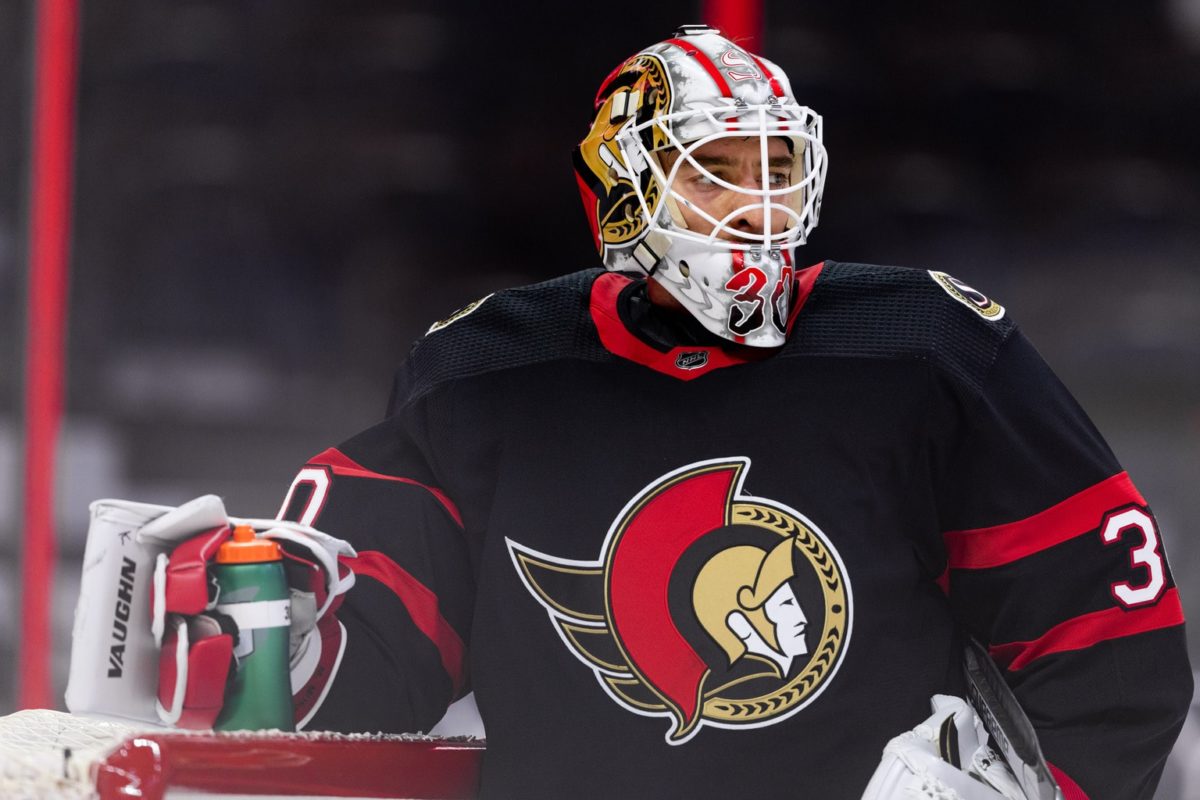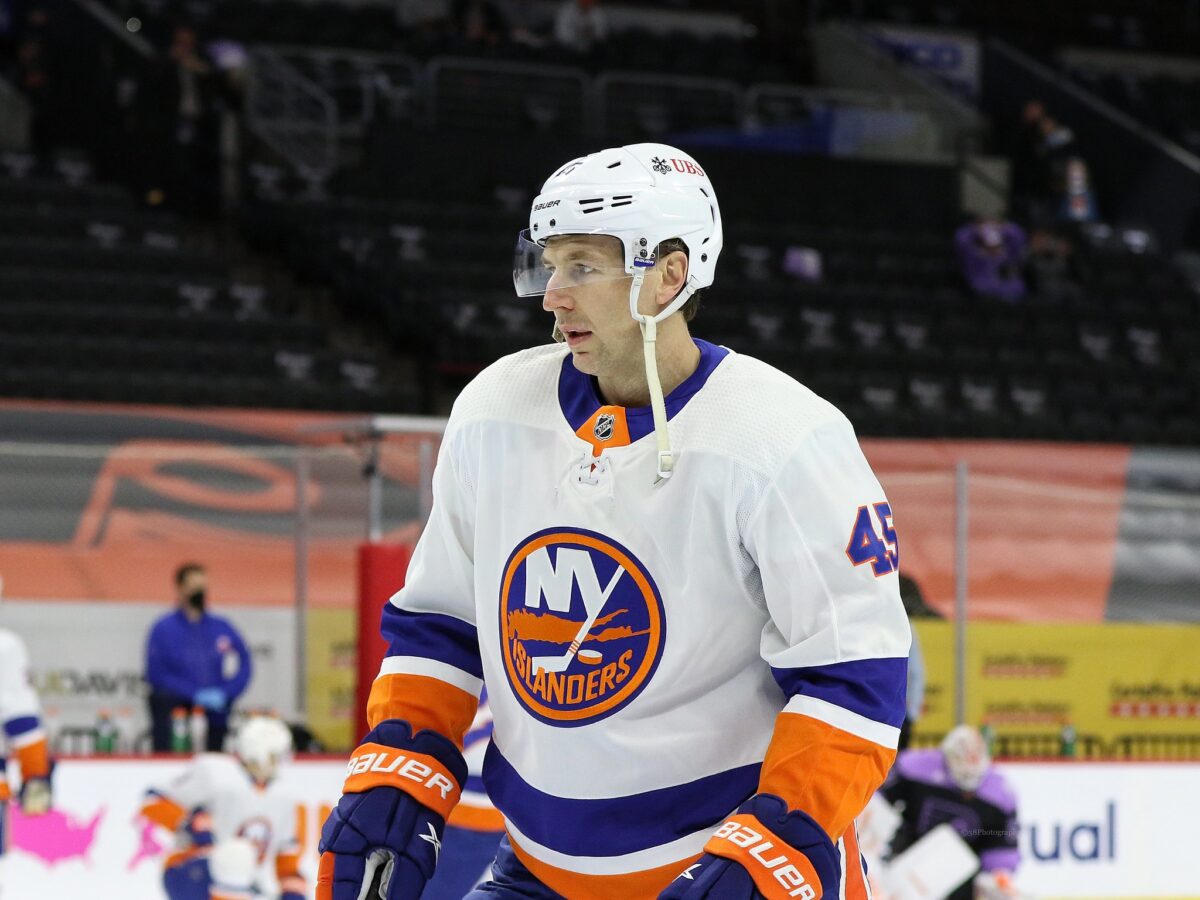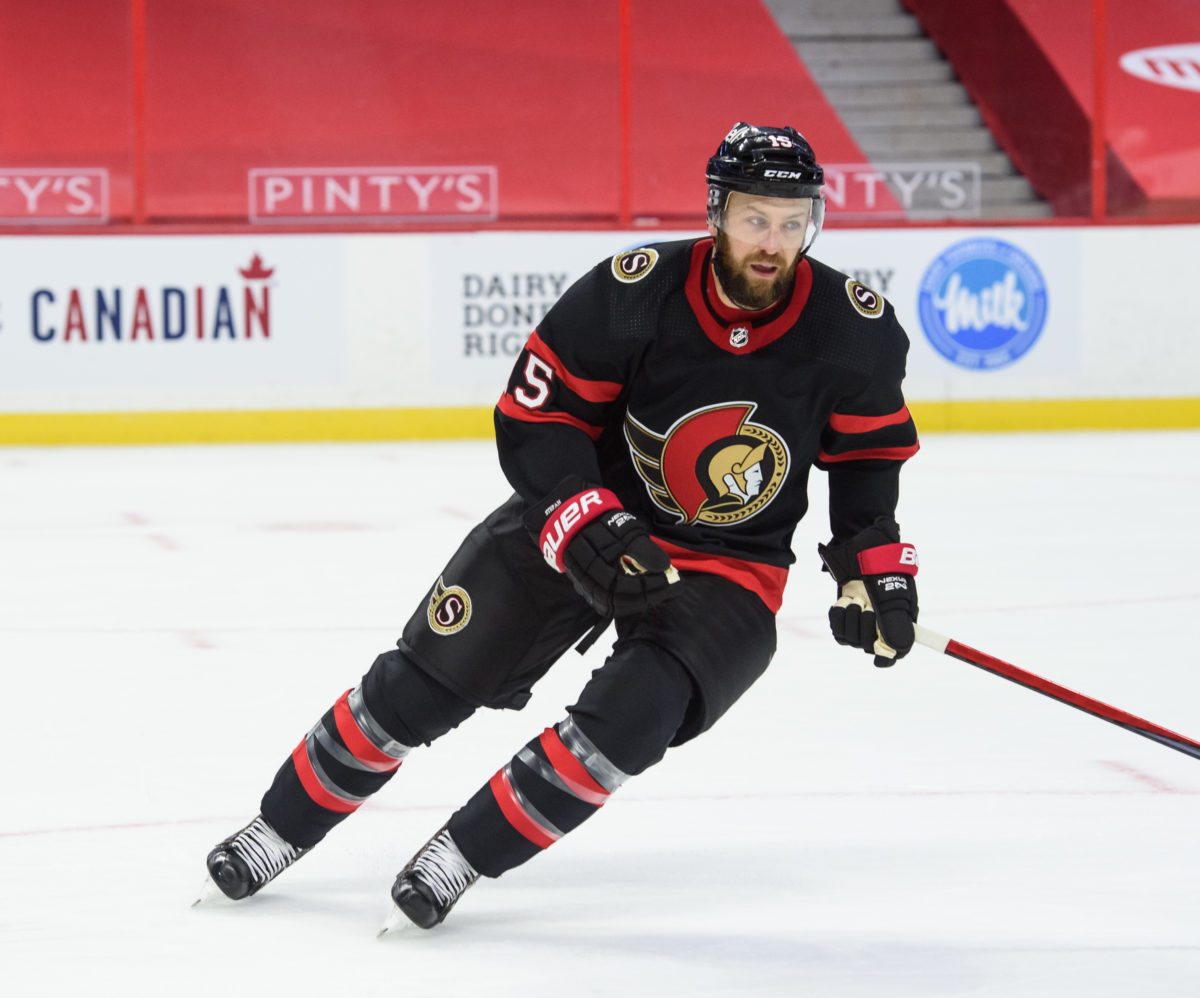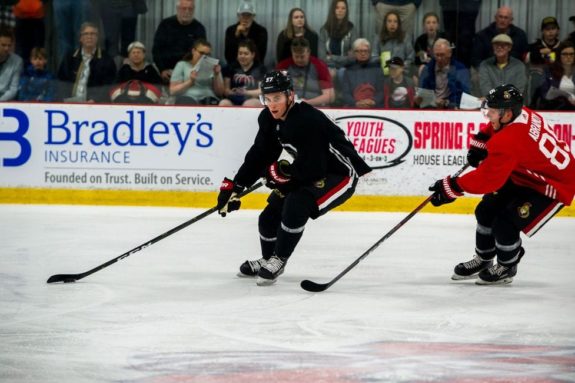There were quite a few new faces to enter the lineup for the Ottawa Senators in the 2020-21 season. They ranged from rookies to role players and a few free agents to start the season. With the season wrapped up for the team, it’s time for some performance reviews. Here I’ll grade the seasons of the Senators who played their first season with the team and who played at least 10 games.
For grading criteria, I looked at the scoresheet and season statistics, but I also considered whether these players helped the team in the area they were brought in to boost, if they were able to show potential of their own, and if they added to the team’s potential going forward. In a few cases, injuries affected the grade for this season, but that doesn’t necessarily reflect my thoughts on the overall skill or potential of the player with the Senators. An A means they likely exceeded expectations, a B means they met expectations, a C means they didn’t quite meet expectations, and anything below is not good.
Goaltenders: Matt Murray
It should be clear by this point that I don’t put the blame completely on Murray or the goaltending alone for the team’s early season struggles. It’s too easy to point fingers at goaltenders and expect them to carry every kind of team in every stage of development, no matter the circumstances. This is a young team that had many new players on defense. Further, in a condensed season where every other team in the division believed they had a shot and did have a shot to make the playoffs, it was going to take some time for the Senators to figure things out.
Murray battled injuries throughout the season, which dampened excitement from fans even as he started to string together some excellent performances, including four wins in five games through the end of February and early March and two shutouts and three wins in his final four games.

Murray’s numbers dipped to the lowest of his career, posting a .893 save percentage (SV%) and 3.38 goals-against average (GAA) across 27 appearances, but if we compare that to other goaltenders who moved to a different team trying to turn things around, it’s not uncommon. Even Sergei Bobrovsky’s numbers dipped to similarly low levels (.900 SV% and 3.23 GAA) in his first season with the Florida Panthers as they attempted to learn how to play better defensively. With realistic expectations in mind, the season wasn’t as treacherous as it may have felt at times, even though the numbers dictate that it was a below-average season for Murray. Injuries made his season feel more strenuous and inconsistent, but there were certainly above-average moments as well.
A healthy Murray is still this team’s starting goalie. He’ll also be pushed by the competition behind him from Anton Forsberg, Joey Daccord, and Filip Gustavsson, who all showed strong play at some point in the season (assuming one isn’t plucked by the Seattle Kraken). It was a tough season, but there’s great potential and high hopes going forward.
Grade: B-
Defensemen: Braydon Coburn
Coburn had a tough run with the Senators. There are intangible things like veteran leadership and advice that I’m sure he gave to this team. He spent a lot of time in the press box, but managed to get into 16 games earlier in the season during the team’s tough run. He couldn’t quite help stabilize the new defensive core, which was something he was brought in to do.

Pierre Dorion was able to trade Coburn for a seventh-round pick, which was probably the best situation for both parties. Coburn has played the most games out of any Atlanta Thrashers draft pick (983) and will get a shot at his second Stanley Cup supporting the New York Islanders.
Grade: C
Erik Gudbranson
Gudbranson’s situation was similar to Coburn’s but a bit brighter. He signed with his hometown team last offseason and was also asked to help stabilize a young and shifting defensive core. The early defensive struggles didn’t look great for the veteran duo, but Gudbranson clearly loved playing for and mentoring this team. He played with heart as they went through its tough opening stretch and continued to log minutes as the trade deadline approached. He still sits fourth on the team in blocks for the season (51) and fifth on the team in hits (92) despite being traded to the Nashville Predators for a seventh-round pick and Brandon Fortunato at the deadline. His heart gives him a bump here in this year-end review. I still wouldn’t count out the possibility of him signing a league-minimum deal to wear the Senators jersey once again.
Grade: B-
Josh Brown
Brown played a few games at the beginning of the season and, like the three men above, had to carry some of the blame for the rough start. He was quickly the odd man out on defense in D.J. Smith’s mind and didn’t play for nearly a month from early February to early March, which didn’t help his case. He’s logged most of his minutes in the last month of the season once space was made on the roster until breaking a bone in his foot on May 3 as Bruce Garrioch first reported. (from ‘SNAPSHOTS: Ottawa Senators sign goalie Anton Forsberg to a one-year contract extension… Josh Brown played with a broken foot,’ Ottawa Citizen, May 5, 2021)
Brown has improved over the season and offers the defensive-first mindset that is seemingly rare in today’s NHL, so he could carve out a spot on the bottom pair. He’ll be entering a contract season in 2021-22, but with an extension in place for Artem Zub and one likely coming to Victor Mete, he’ll have to push to get the ice-time needed to prove his value to the team.
Grade: C+
Artem Zub
Zubmania hit Senators fans not too long into Zub’s NHL career. He entered the lineup on Jan. 31 and notched two assists in his first two games and managed to come out with an even plus/minus rating after back-to-back losses to the Edmonton Oilers by a combined score of 11-7. His ability to move the puck efficiently and match the speed of offensive players helped to stabilize the defensive group. His stock benefited from joining the team as they came out of the slump, but he was undoubtedly part of the reason that the team started playing better.
His calm demeanour and quick feet on the back end helped break poor defensive habits and his swift puck-moving skills helped create stronger breakouts and rush chances as exemplified on his first two NHL points. I haven’t even mentioned his first NHL goal, which is about as memorable as they come. There are defensive coverage situations to improve, but for a first season, there’s not much more to ask from Zub.
Grade: A
Victor Mete
Mete was a late addition to the Senators this season, but he’s arguably one of the most successful and impactful additions. He’s only played 14 games with the team but appears to have earned himself an extension. In Thomas Chabot’s absence, Mete has picked up the ice-time normally allotted to Chabot (capping the season off with 25:02 time on ice against the Toronto Maple Leafs on May 12) and has proven to be a beneficial factor at 5-on-5 and on the penalty kill.
Mete isn’t a massive points producer like Chabot, but he’s quick and agile, allowing him to break up plays and move the puck quickly like Zub. Indeed, a Mete-Zub pairing offers an interesting option for the Senators going forward if both players can continue the solid play into next season or either player might anchor a pairing with younger or less-experienced players like Erik Brännström and Jacob Bernard-Docker. Mete certainly exceeded expectations over his short time with the Senators so far.
Grade: A
Forwards: Evgenii Dadanov
Dadanov is another veteran presence that Dorion added in the offseason to help boost some of the production that might be missing while younger players get accustomed to the NHL. He was signed to quite an extensive contract for an over-30 player (three years for $15 million) that perhaps unfairly bloated expectations for him. I think the Senators were hoping for at least 20 goals and 40 points from the offensive specialist that Dadanov is, but his totals dropped off rather noticeably from his prior three seasons with the Panthers. He only put up 13 goals and seven assists and, unfortunately, was only able to muster one assist on the power play, an area I think the Senators were expecting him to help with on the first unit, if not lean on him on the second unit. Hopefully, he’ll be able to turn things around for next season or tough conversations may arise.
Grade: C
Derek Stepan
One running theme here is that the veteran players brought in during the offseason to help this team didn’t fair as well as Dorion or many Senators fans hoped. Making space for some of the young faces was ultimately forced on management and the coaching staff when the situation wasn’t going well in January and then players like Stepan hit the injured list.

You’ve got to feel for Stepan who left his family in Arizona to come play in Ottawa and found it quite difficult to be away from them for an extended period of time. That would weigh on anyone, so it wasn’t a big surprise when rumours started to come out that he was hoping to head back to the United States to be closer to family. The injury to his shoulder ultimately took him out of the lineup and capped off a tough season overall for the veteran. The grade isn’t a judgement of his character, but rather just a reflection of the difficulty of the season.
Grade: C
Austin Watson
Arguably one of the most effective pick-ups (traded by the Nashville Predators to the Senators for a fourth-round pick in 2021) prior to the 2020-21 season was Austin Watson. He is a bottom-six role player who brings a bit of grit to the roster and some experience. With a cap hit of $1.5 million for the next two seasons, the price is right. With 10 points in 34 games this season, he was on pace to surpass his point total from the 2019-20 season (14) and nearly match his career high from the 2017-18 season (19). This included a stretch of four points in six games while averaging only 12:00 of TOI.
Unfortunately, like many new acquisitions for the Senators this season, he suffered an injury (thumb) that ended his run. Watson has proved to be a solid addition and brings the kind of heavy game that the Senators’ lineup doesn’t have an abundance of. His value will only increase if the team can make the playoffs in the coming seasons because he was part of a couple deep runs with the Predators.
Grade: B
Clark Bishop
Bishop’s season is difficult to assess. He only got into 13 games this season but left quite a mark. He plays the perfect style for a fourth-line centre and has no difficulty driving a shutdown line. He kills penalties well and can add an offensive touch. He tied his career high this season of (three points) in seven fewer games, having only played 20 games in 2018-19 and five in 2019-20 with the Carolina Hurricanes. There’s a bit of a logjam down the middle for the Senators with the emergence of Shane Pinto, however.
They’re not overloaded with superstar centres just yet, but they have a good group of hardworking centres, which puts Bishop just on the outside for now. He’s an important player to re-sign for depth (he becomes an unrestricted free agent this offseason) because he’ll put pressure on the other centres to keep up their game. He could also still become a regular part of the lineup if given the opportunity.
Grade: B+
Tim Stützle
It’s hard not to be over the moon about this young player. Stützle broke out at the IIHF World Junior Championship for many North American fans and came ready to play for the Senators. He was responsibly sheltered by the coaching staff, but given opportunities to play to his strengths when possible.

Despite needing some defensive work that most young players develop as they mature in the league, Stützle’s performance this season was admirable for a 19-year-old on a team in the midst of a rebuild. Other high draft picks are faced with unrealistic expectations and can have a difficult time getting their feet under them, but he managed the workload well and added some highlight-reel goals to help reach 29 points in 53 games in his rookie season. This was capped off by a hat trick on May 8 and a fun celebration by fans.
Grade: A-
Ryan Dzingel
The return of Ryan Dzingel (yes, he’s played for the Senators before but not since 2018-19, so he was a new addition this season) was a welcome sight for Senators fans and it was a positive move for the player. He’s someone who enjoys playing for the organization and has found comfort in the city.
Latest Senators Content:
- Senators’ Goaltending Depth After Free Agency
- Senators News & Rumors: Tkachuk Denies Trade Rumors & More
- Jake Chiasson: Everything to Know About Senators’ New Acquisition
This was reflected in the fact that he notched five goals in his first nine games with the team after only putting up two goals in 11 games with the Hurricanes to start the 2020-21 season. He added some offensive depth as expected but unfortunately went quiet during the final month. Dzingel is also an unrestricted free agent and will likely get priced out of his spot in the Senators’ lineup with all the young talent emerging that can be signed for a much smaller cap hit.
Grade: B
Shane Pinto
Pinto is one of these emerging young stars for the Senators. He only played in 12 games for the team after finishing his time with the University of North Dakota. After fitting in rather seamlessly, he also left quite an impression on the coaching staff. He scored his first NHL goal and added six assists, but it was his sense of defensive responsibility for such a young player that was most impressive. With so few NHL games to his name, Smith still felt comfortable enough to give Pinto time on the penalty kill, averaging 1:15 of shorthanded TOI.

As luck may have it, but notable nonetheless, Pinto finished with a team-high plus-6 on the season alongside Alex Formenton. Obviously, the number is skewed by the number of games played and his absence during the rough days in January, but he only finished with a minus rating twice (minus-1 in both instances) over his 12 games. It’s not much to go on, but it helps confirm the positive feedback about his defensive awareness extolled by coaches. If Pinto continues on this development path, he may quickly become a fan favourite.
Grade: A
Missing Notables
Despite it being his true rookie season, I didn’t include Josh Norris on this list because he played three games with the Senators in 2019-20 and will get his own analysis elsewhere. Two goaltenders, Anton Forsberg and Filip Gustavsson, displayed strong play in what amounted to emergency backup appearances, but they only played in eight and nine games, respectively. Forsberg looked like a strong backup goaltender, earning him an extension, and Gustavsson looked like a future starting goaltender.
There it is. The report card for the newest Senators’ seasons. If you have any thoughts on the grades or grading scheme, feel free to leave a comment below!